 MyDogBreeds
MyDogBreeds Tahltan Bear Dog is originated from Canada but Beagle-Harrier is originated from France. Tahltan Bear Dog may grow 7 cm / 2 inches shorter than Beagle-Harrier. Tahltan Bear Dog may weigh 16 kg / 35 pounds lesser than Beagle-Harrier. Both Tahltan Bear Dog and Beagle-Harrier has almost same life span. Tahltan Bear Dog may have less litter size than Beagle-Harrier. Tahltan Bear Dog requires Low maintenance. But Beagle-Harrier requires Moderate maintenance
Tahltan Bear Dog is originated from Canada but Beagle-Harrier is originated from France. Tahltan Bear Dog may grow 7 cm / 2 inches shorter than Beagle-Harrier. Tahltan Bear Dog may weigh 16 kg / 35 pounds lesser than Beagle-Harrier. Both Tahltan Bear Dog and Beagle-Harrier has almost same life span. Tahltan Bear Dog may have less litter size than Beagle-Harrier. Tahltan Bear Dog requires Low maintenance. But Beagle-Harrier requires Moderate maintenance
 The primitive Tahltan Bear Dog comes from Canada. The dog was developed by the Tahltan people to hunt bears, so you can imagine he was a strong, brave dog.
The primitive Tahltan Bear Dog comes from Canada. The dog was developed by the Tahltan people to hunt bears, so you can imagine he was a strong, brave dog.
They also had fox-like yaps that confused bears until the hunter could come and kill the bear. These dogs are descended from pariah-type dogs with their diet being birds and fish.
It was in 1988 that the Canadian Post Office honoured the Tahltan Bear Dog by having a picture of it appearing on a stamp.
Some people claim that after the 1960s there are no longer any living descendants while others say that breeding projects were established and that there are still a few of these dogs around today. There are records on the other hand that claim the dog became extinct in the 1970s.
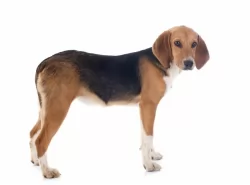 The Beagle Harrier, the breed that was made mixing the France Scent Hounds and a Beagle.
It is not quite sure if this breed was made on purpose or the mix of the breeds happened and resulted in a great dog so the breeding continued.
Since they are not large dogs as hounds, they are used to hunt small animals.
The Beagle Harrier, the breed that was made mixing the France Scent Hounds and a Beagle.
It is not quite sure if this breed was made on purpose or the mix of the breeds happened and resulted in a great dog so the breeding continued.
Since they are not large dogs as hounds, they are used to hunt small animals.
This first breeding took place in England, but after the 14th century, they were breed on purpose in France.
 Not like a bear, but more foxy in appearance or even more like a husky, the Tahltan Bear dog is medium sized, standing at between 36 – 43cm in height and weighing between 6 – 9 kg.
Not like a bear, but more foxy in appearance or even more like a husky, the Tahltan Bear dog is medium sized, standing at between 36 – 43cm in height and weighing between 6 – 9 kg.
It is believed that they were similar to spitz and pariah type dogs, and were athletic. The short to medium length coat of the dog was mainly black or brown with some white.
He had fairly large pointed, erect ears and also a fairly pointed muzzle. The tail was interesting and was short and furry and always carried erect.
The Tahltan Bear Dog is fearless, not being deterred when meeting large bear. It's why the dog has been valued by hunters – their bravery and fearlessness.
They’re great family dogs too and will get on well with children. He is intelligent and easy to train if you want to give him training and socialization.
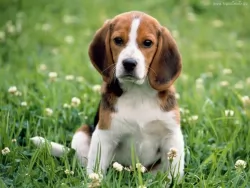 The Beagle Harrier is a scent hound that is described as a big sized Beagle or a small sized Harrier. This breed was developed from this two breeds, actually. Despite the looks of these breeds, the Beagle Harrier is an energetic kind of dog who gets very attached to his family. This medium sized pet comes in variations of colours and they are usually tricoloured. They usually have dark coloured eyes, white paws, and They usually grow up to have a very muscular body, but, if you don’t provide them with the daily activity they need, they will quickly get obese and unhappy.
The Beagle Harrier is a scent hound that is described as a big sized Beagle or a small sized Harrier. This breed was developed from this two breeds, actually. Despite the looks of these breeds, the Beagle Harrier is an energetic kind of dog who gets very attached to his family. This medium sized pet comes in variations of colours and they are usually tricoloured. They usually have dark coloured eyes, white paws, and They usually grow up to have a very muscular body, but, if you don’t provide them with the daily activity they need, they will quickly get obese and unhappy.
 Because some claim that this dog is extinct, there are only a few accounts of what he is actually like.
Because some claim that this dog is extinct, there are only a few accounts of what he is actually like.
Even though they were hunting dogs, they were devoted pets and companions of the people of the Yukon.
If these dogs are still to be found today, you will find them to be easy going, protective, loyal, intelligent, playful, alert, watchful and energetic. Just don’t allow them to get too hot as they prefer cooler climates.
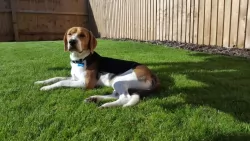 The Beagle Harrier, if trained properly and socialized while he was still a pup, will be the great playmate for any child. They get along with strangers, as well. We might say that they will get along with anybody who is ready to run and play with him. Children are most likely that kind of playdate, so it appears that they like children more. The Beagle Harrier is a great family pet, and he is great with babies, toddlers, teenagers… so don’t be afraid to leave the dog alone during the playdate!
The Beagle Harrier, if trained properly and socialized while he was still a pup, will be the great playmate for any child. They get along with strangers, as well. We might say that they will get along with anybody who is ready to run and play with him. Children are most likely that kind of playdate, so it appears that they like children more. The Beagle Harrier is a great family pet, and he is great with babies, toddlers, teenagers… so don’t be afraid to leave the dog alone during the playdate!
hunting, scent tracking, search dog
Some will say that the Beagle Harrier is one of the most desirable pets because of his loving and lively nature. They get along with almost anyone and they don’t mind living indoors if you have the time to take him out for a daily run each day. They will do great in a large group of people and any public places so you can take your Beagle Harrier with you anywhere you go.
Since the Beagle Harrier is placed in a group of the hound dogs, you must be aware that he will have the attitude of the pack leader. Once you got the Beagle Harrier puppy, you must start training and socializing him in order to grow the pet that will be easy to handle and accepted by the family and all the people around you, even strangers. They are very intelligent and they have a calm nature so they will be quite easy to train.
 Healthy dogs are unlikely to pick up any of the many common dog illnesses there are. There are many – cancer, diabetes, bloat, hip dysplasia, ear infections, dental disease and many more.
Healthy dogs are unlikely to pick up any of the many common dog illnesses there are. There are many – cancer, diabetes, bloat, hip dysplasia, ear infections, dental disease and many more.
This is a contagious and infectious disease known as canine tracheobronchitis and which is transmitted through the air. Treatment is usually administered as a nasal spray, but your dog will need to get to the vet because of his dry, honking cough and lack of appetite.
This is a viral disease which in most instances is fatal. It is mostly transmitted when an animal that carries the disease bites the dog. Your dog develops behavior which is totally uncharacteristic of him. He'll also froth at the mouth and become aggressive. Death is nearly always guaranteed.
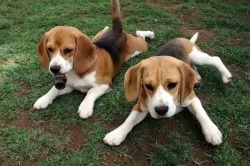 Almost every active dog suffers from joint diseases. Even though it’s generally a genetic disease, you can lower the chances of hip or elbow dysplasia by taking care of your dog’s weight, diet and daily exercise.
Almost every active dog suffers from joint diseases. Even though it’s generally a genetic disease, you can lower the chances of hip or elbow dysplasia by taking care of your dog’s weight, diet and daily exercise.
The Beagle Harrier has big ears that are always set down. That makes them ideal for the dirt accumulation, ear irritations and ear infections. Check his ears regularly and clean them at least once a week.
 This double coated hunting dog’s thick coarse coat will require brushing at least twice a week to free the dog of loose hair. He is regarded as a low mainenance dog.
This double coated hunting dog’s thick coarse coat will require brushing at least twice a week to free the dog of loose hair. He is regarded as a low mainenance dog.
During brushing, you would check inside his ears and make sure there are no signs of redness. Eyes of the dog should be bright, eager and free of discharge.Always keep the nails of the dog trimmed.
If you keep your pet outside for any lengths of time it is imperative that this dog has shade to lie down in as he doesn’t do well in too much heat.
Because he is a hunting dog, he is used to being outdoors and being active. He wont be content to lie around inactive for too long. He’ll want at least a walk every day and some ball games.
A pet dog can’t choose his own food so they depend on us to make the right choices for them. It’s always convenient to have a packet of commercially manufactured dog food available, but who knows if this dog, which some claim is extinct, ever ate commercially manufactured food.
If he did, you would want to mix it every now and again with home made food - boiled chicken, sweet potatoes, brown rice or pasta, carrots and spinach. This food could be chopped up and added to the dog’s kibble.
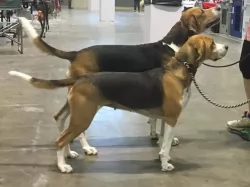 Since the Beagle Harrier is an active dog breed, they will need food for the active dogs. Make sure you provide them with quality food that will give them enough strength to get through the very active day, and not gain too much of the weight. It is very important that you don’t overfeed him because this breed quickly becomes obese. It is advisable to use treats while you train him to do new tricks, but be very careful with the amount you give to the dog.
Since the Beagle Harrier is an active dog breed, they will need food for the active dogs. Make sure you provide them with quality food that will give them enough strength to get through the very active day, and not gain too much of the weight. It is very important that you don’t overfeed him because this breed quickly becomes obese. It is advisable to use treats while you train him to do new tricks, but be very careful with the amount you give to the dog.
Puppies need to be fed only two times a day. Once you decide which brand of food you will use, stick with them until the dog is 6 months old. Make sure they have enough nutrients and the quality ingredients that will help them with growing strong and healthy bones.
If you want Beagle Harrier to grow up in a happy and healthy dog, make sure you provide him with quality food, lots of exercises and unconditional love. They are extremely loving and they get depressed if left alone. Grooming tips are very clear – they need a regular brush because shed a lot. The more you brush, the less hair you will find on your hands during the belly rubs.
If your Beagle Harrier is trained and socialized, the dog park will be the best daily activity for him. If there is no dog park near your house, take him to the bike ride, jogging, swimming, hiking, markets, parks… They love to be off the leash and with people but since they are the hound dogs, don’t be surprised if they get distracted by smelling something more interesting than the ball. They would love to grow up in a house with a large yard, but, if you live in the apartment, make sure that you take time for his daily activity.